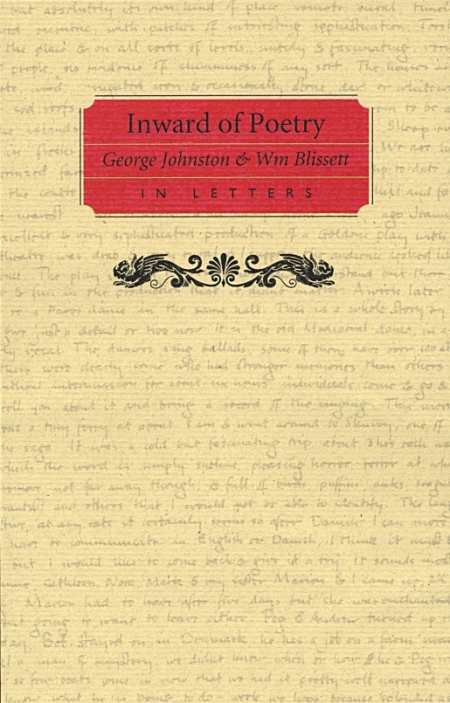Inward of Poetry
Inward of Poetry is a journey, through correspondence, into the friendship of Canadian poet George Johnston and Canadian scholar William Blissett. Both men of letters, Johnston and Blissett met in graduate school in the late 1940s, beginning their fifty-year correspondence upon their departure to distant academic posts. Serving as a memoir of the men’s lives and their scholarly vocations, Inward of Poetry provides readers with an intimate account into the minds and times of Johnston and Blissett.
Johnston is known to have written 180 letters to Blissett in his lifetime, and Blissett wrote more than 142 (correspondence from the 1990s has been mislaid). Sean Kane, the editor of the collection and a past student of George Johnston, expertly presents the men’s friendship through his chapter-by-chapter narration, providing background information to set the stage for the letters. Kane’s careful excerpting of the letters and notes of clarification delve deep into the significant aspects of each man’s life.
In the early chapters of the book, Blissett and Johnston focus on the vocation to which each has felt called. Their ideas on teaching, scholarship, and their own reactions to what they had been reading and writing fascinate. In a discussion of a meeting they had both attended, Blissett disagrees with Johnston’s outburst (accompanied, notes Blissett, by “breathing down my neck”) that English is a dead language, like Irish, that shouldn’t be taught in university. Johnston’s charming response, indicative of their ease with one another, reads: “I am an owl, everything I say sounds owlish to me—but I do believe that I might sound like a comfortable owl if I were writing to you.”
In middle chapters of the book, centered upon Johnston’s poetry collections (Cruising Auk, Home Free, and Happy Enough), Johnston settles into his role as a “comfortable owl,” full of long-range vision for what he hoped for in his poems and for Canadian literature as a whole. Trusting the insight and honesty of his friend, Johnston sends Blissett poems that he is working on, and Blissett, in turn, sends his encouragement and criticism: “The Bargain Sale is…one of the truly great: don’t change a syllable. Daisy hasn’t gotten across to me yet.” Poem after poem, Blissett weighs in, both before and during his long-term tenure as editor of the University of Toronto Quarterly.
While all of the letters are peppered with personal details, the last chapters of the book center on fellow poets, family, travels, and seasons and occasions. Johnston’s wife and many children shine in these chapters, as do Johnston’s feelings about the changing world. (“We have not yet brought a television into the house. I find that the self-important and self-destroying world already penetrates too deeply.”) In Blissett’s letters, we learn more of his care for his mother and her death, his obsession with opera, and his extended family of colleagues.
Rich with historic, personal, and scholarly detail, the letters between William Blissett and George Johnston are a necessary addition to the academic and personal libraries of Canadians and those interested in Canadian literature. Through Kane’s fine editing, the lives and work of two outstanding countrymen are preserved and made accessible for generations to come.
Reviewed by
Jennifer Fandel
Disclosure: This article is not an endorsement, but a review. The publisher of this book provided free copies of the book and paid a small fee to have their book reviewed by a professional reviewer. Foreword Reviews and Clarion Reviews make no guarantee that the publisher will receive a positive review. Foreword Magazine, Inc. is disclosing this in accordance with the Federal Trade Commission’s 16 CFR, Part 255.

